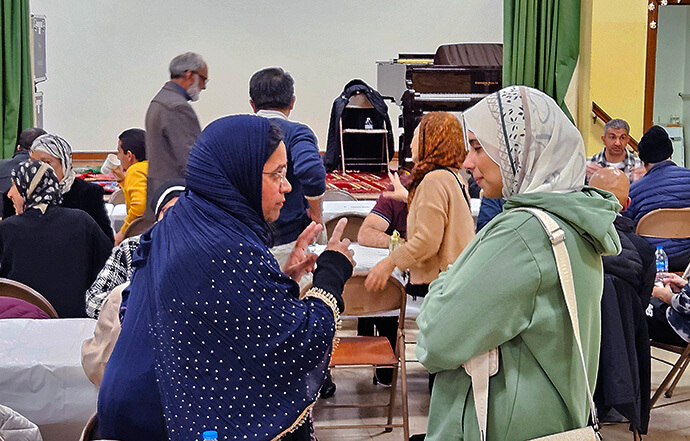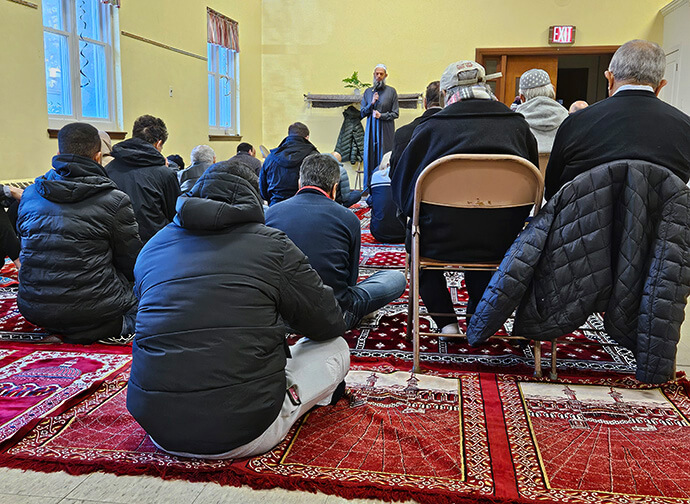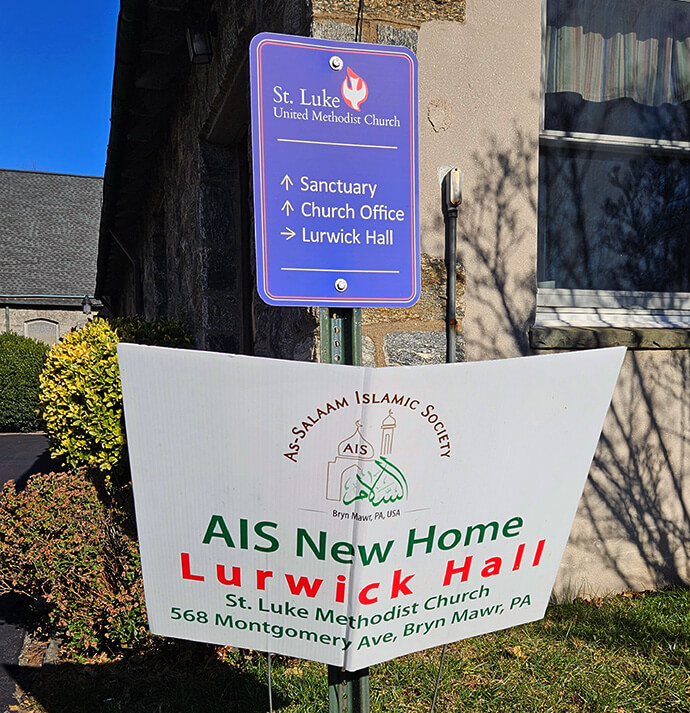Key points:
- St. Luke United Methodist Church has welcomed the As-Salaam Islamic Society to host weekend prayer gatherings, Sunday school classes and fellowship events.
- Together they are fulfilling a denominational commitment to bridge the divide that exists between many people of the Christian and Islamic faiths.
- Despite their differences, the Rev. Mark Salvacion, St. Luke’s pastor, has sought to help his congregation embrace its tenant neighbors and learn from them through conversations and cooperation.
St. Luke United Methodist Church near Philadelphia is developing a friendship with Muslim neighbors who use its fellowship hall for Friday prayers, children’s classes and special events.
Together they are fulfilling a denominational commitment to bridge the apprehensive divide that exists between many people of the Christian and Islamic faiths.
While Christians remained the world’s largest religious group at the end of the decade in 2020, Christianity’s growth did not keep up with global population increase. But Islam — the world’s fastest-growing major religion — increased its share of the world population, as did the religiously unaffiliated, the Pew Research Center found in a report released June 9.

In “Called to Be Neighbors and Witnesses: Guidelines for Interreligious Relationships,” the 2024 Book of Resolutions (Resolution 5202) calls on United Methodists, individually and collectively “to overcome our fears and misapprehensions … and to open ourselves to dialogue and engagement with persons of other faith communities” (Page 721).
Moreover, Resolution 5204 commits the church to take steps toward “more hospitable and cooperative relationships and encourage dialogical relations” with “Our Muslim Neighbors.” It also offers relationship-building suggestions (Pages 731-735).
St. Luke United Methodist, located in the mostly affluent Main Line suburbs just beyond Philadelphia, is taking those resolutions to heart and modeling the denomination’s longtime motto of having “Open Hearts, Open Minds, Open Doors.”
The church rents Lurwick Hall, a comfortable event space with classrooms located near its sanctuary, to the As-Salaam Islamic Society to host weekend gatherings for prayer, Sunday school classes for children, and occasional feasts with fellowship.
The affordable rent is much less than the small congregation could charge other non-religious groups that have sought to rent the space due to its prime location. But for St. Luke, use of the hall is more about ministry than money.
That ministry connects groups of two venerable faiths with much in common. Both trace their beginnings back to Abraham, revered as the father of three faiths in the Bible and in the Muslim holy book, The Quran (Koran).
Both monotheistic faiths also honor Jesus of Nazareth as a primary prophet sent by God, or Allah. That includes his virgin birth and miraculous deeds, his ascension to heaven, and his prophesied return to earth in its final days to help lead God’s triumph over evil.
Key differences include the Muslim belief in Muhammad as Allah’s final prophet and Christian beliefs in the Holy Trinity and the role of Jesus as the humanity’s sole savior through his crucifixion.
Despite those differences, the Rev. Mark Salvacion, St. Luke’s pastor, has sought to help his congregation embrace its tenant neighbors and learn from them through conversations and cooperation.
One thing they have surely learned is that the standard Muslim initial greeting is one of peace: Assalam u alaikum, meaning “Peace be unto you.”

At a Sunday worship service in 2024, during the Muslim fasting season of Ramadan, Salvacion interviewed As-Salaam Islamic Society president Ahmad Abdel-Hamid before the congregation. The two also led a joint Bible study that compared the Quran and the Bible. Members of the church and AIS have attended each other’s major events and collaborated in such ministries as a back-to-school bookbag collection last fall.
“I believe our relationship is a success story that’s working well,” Salvacion said.
The ordained elder came to St. Luke in 2022, after leading Philadelphia’s Historic St. George’s United Methodist Church for five years. He is a former corporate attorney whose legal acumen has benefited both churches and the Eastern Pennsylvania Conference.
Salvacion established and directed the conference’s former immigration legal services ministry, Justice for Our Neighbors — a national United Methodist-related program now named the Immigration Law and Justice Network. And he was just named the conference’s new chancellor to serve as its primary legal adviser and representative.
St. Luke had hosted a loosely organized Muslim prayer group for several years. But group members also moved around to other locations, including a nearby community center that became unsuitable for their Sunday children’s school.
Subscribe to our
e-newsletter
Finding a stable home in the area had become a crucial challenge when the ideally located Villanova Masjid, also known as the Foundation for Islamic Education, was forced to close in 2018 after nearly 20 years of serving the needs of Muslim residents in the area. The foundation moved more than 20 miles away, leaving a void for Muslim families, including many college students who live, study and work in the Villanova area. They needed a nearby place to pray and fellowship together and where their children could learn about their faith.
When he arrived at St. Luke in 2022, Salvacion and church trustees worked with Abdel-Hamid and other AIS board members to forge a formal contract and relationship. He also sought advice from the Rev. Christopher Kurien, a fellow pastor of Indian heritage, who is well-regarded as a cross-cultural and interfaith bridge builder. Their mutual goal was to make the new Muslim society feel more welcome, stable and able to grow there.
“Lurwick Hall is a good, safe space for us because it’s located on the church campus, but it’s separate from where the congregation worships,” said As-Salaam Islamic Society former vice president Gail Montgomery Watson. She is St. Luke’s longtime communications director and lives near the church.
Their eventual goal is to establish a new Masjid for Muslim residents in the Main Line area. But for now, they are happy at St. Luke. “There’s good parking, a playground for our children and discreet signage to help us keep a low profile,” Watson said.
As-Salaam Islamic Society’s Sunday afternoon school attendance attracts about two dozen children, reports Abdel-Hamid. “Our goal is to build good character and an Islamic identity, and to provide them with a foundational knowledge of Arabic, the Quran and Islamic life and values.”

So far, there have been few signs of resistance to the group’s presence in the community. “We’re not well known,” Watson said. “So, we can have worship freely without criticism from this community. St. Luke’s has been extremely protective of us.”
Salvacion admits he has received some disturbing, anti-Muslim pushback from his peers in the local interfaith ministerium. And the federal government’s widespread, intensified efforts to find, detain and deport immigrant residents has heightened his concern and caution.
But the pastor/lawyer remains undaunted. His relationship with As-Salaam Islamic Society leaders has grown close, setting a good example of interfaith partnership-building in a religiously divided culture.
Abdel-Hamid and fellow board officers Fred Fathy Akl and Sherif Bassyouni are all from Egypt. But As-Salaam Islamic Society’s members are international, multiracial and predominantly Sunni, the largest branch of Muslims in the world.
Dozens of members and guests arrive each Friday afternoon for Jum’ah (“Friday” in Arabic), which are weekly congregational prayers required of all Muslims. They remove their shoes, and most sit or kneel on colorful prayer rugs to hear a teaching (khutbah) by Abdel-Hamid or a guest lecturer. Then, standing, kneeling and bowing in prescribed postures, they hear and recite chanted prayers and phrases in Arabic from the Quran.
Afterward, they can leave offerings at the door, pick up fliers about upcoming events, and then either spend moments in fellowship or quietly depart.
Many more come there during Ramadan, an annual holy month of fasting and fellowship that happens according to the lunar cycle in the Islamic calendar. This year it occurred from Feb. 28 to March 30.
Adherents fast from dawn until sunset. They come to Lurwick Hall on weekends to pray and then share with their families and friends in Iftar, a nightly celebratory breaking of their fast, before joining in more hours of prayer. Salvacion, his wife, Fran, and church members and guests joined in an Iftar feast one Saturday evening in March.
“Fasting gives us joy to celebrate that we are able to meet the commands of God,” explained Abdel-Hamid. “So, it elevates our connection with God. And it strengthens the bond among our community members when we do it together in a way that reminds us of Allah.”
Board officer Fred Fathy Akl, who, like Abdel-Hamid, taught engineering at area universities, emphasizes another important responsibility of Ramadan: Zakat, “the sharing of one’s possessions with the poor, many of whom are having a hard time,” he said. Ramadan is “when we collect as many donations as possible to meet needs that exist year-round.”
This concept of Zakat, he explained, is to “purify one’s money” by giving to others an amount or percentage that exceeds what one really needs.
Last year, As-Salaam Islamic Society was able to support eight families, he reported, giving monthly payments for necessities to mainly single parents with children.
“One thing that really amazed me,” Salvacion said, “was to see how many people come for Jum’ah prayers and even more who come to break the fast during Ramadan. It helped me understand that there are many faithful Muslims in our community. So, my mission at St Luke is to help people understand that we are all neighbors who live in this community, and we must care about each other, especially about our poor and needy neighbors.”
Eid al-Fitr, one of two major Muslim festivals each year, celebrates the end of Ramadan, based on the first sighting of a new crescent moon. It typically includes a feast, gift-giving and acts of charity.
Eid Al-Adha, the other major festival, happens at the culmination of the annual Hajj pilgrimage to Mecca and focuses on sacrifice, reflection, communal prayers and a special meal. It commemorates the willingness of Abraham (Ibrahim) in Scripture to sacrifice his son in obedience to God’s command.
As-Salaam Islamic Society celebrated Eid Al-Adha in Lurwick Hall on Friday morning, June 6, with prayers, teaching, breakfast, children’s games and fellowship. As always, St. Luke members were invited to attend.
“In Islam, we have an open door, just like in Christianity,” said Abdel-Hamid. “We feel loved here, and that helps make this a good place to celebrate our faith and to teach our children.”
Coleman is a UM News correspondent and part-time pastor. News media contact: Julie Dwyer, news editor, [email protected].




